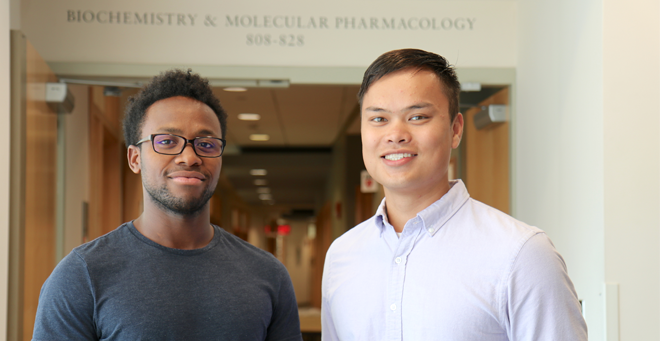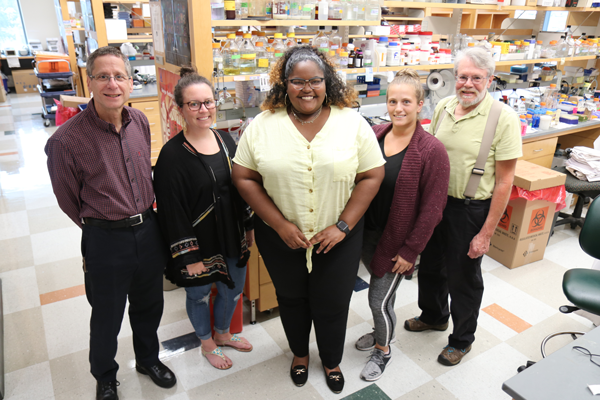
|
|

|
Laboratory research experience for college students interested in biomedical sciences can be key to their future careers. As members of the UMass Medical School Summer Undergraduate Research Opportunity Class of 2019, Sang Vo and Amina Bradley are among 29 undergraduates who conducted biomedical research under the tutelage of faculty, students and postdoctoral fellows at UMMS.
“I’m very grateful to be able to work and grow in this environment. The support here is phenomenal,” said Vo, a rising senior at UMass Boston. “The experience has helped me bring my skills to a whole new level.”
During 10 weeks in the laboratory of Celia Schiffer, PhD, professor of biochemistry & molecular pharmacology and director of the Institute for Drug Resistance, Vo used x-ray crystallography to create an atomic model to better understand how to improve the resistance profile of a drug used to treat hepatitis C. Vo said he is confident that the experience will help him achieve his senior year goals to conduct further research while applying to research-focused master’s programs.
“I’m more focused on what I do,” Vo said. “When you’re doing these experiments you have to concentrate, think things through and plan them out.”
Now in its 27th year, the Summer Undergraduate Research program is designed to diversify the pool of biomedical researchers by providing structured, hands-on laboratory research experiences to undergraduate students, especially those from backgrounds underrepresented in the field, or who are economically or educationally disadvantaged. Funding is provided by either the National Institutes of Health or UMMS.
Bradley, a rising senior at North Carolina Agricultural and Technical State University, became a valued team member under the direction of Stuart Levitz, MD, professor of medicine; Charles Specht, PhD, associate professor of medicine; lab technician Christine Gomez; and PhD student Maureen Hester. Drs. Levitz and Specht credited their own undergraduate research experiences as instrumental in their subsequent careers.
“I got interested in research when I spent a summer in a lab during college, so I have always felt it is important to have summer students because that’s what gets people excited about research—if you’re not introduced to it, you’re never going to realize if it’s something you want to do in life,” Levitz said.
“We’ve had five undergrad students here, each one doing a very different project each year,” said Specht. “We find it very rewarding because we can plunge into a new area we hadn’t been tempted to go into. Having to come up with new projects pushes us to explore new paths.”
Previously focused on becoming a physician, Bradley now wants to earn a PhD as well as MD. Like Vo, she plans to acquire further preparation in a postbaccalaureate program before applying to MD/PhD programs, including the one at UMMS.
“I’ve had other research experiences doing small tasks to learn the most basic lab techniques in the past, but nothing like this,” she said. “This is the first time I’ve gotten to collaborate on a very large project. It has opened my eyes to a whole new realm.”
The program benefits lab members as well as the visiting undergraduates. In addition to receiving input and mentorship from an established scientist like Schiffer, Vo was directly supervised by Jacqueto Zephyr, a graduate student in the lab who aspires to run his own academic research lab. “Participating in the program helps me review and refresh my own knowledge and skills,” said Zephyr. “It’s great preparation for teaching and mentoring as a principal investigator.”
Bradley was directly supervised by Gomez and Hester. “I was excited to have a college student because my undergraduate experience here completely changed my trajectory,” said Hester, who, after graduating from Worcester Polytechnic Institute in 2016, worked in the lab as a technician prior to matriculating at the GSBS. “I fell in love with research.”
Also a recent college graduate, Gomez is pursuing a second bachelor’s degree at her alma mater Becker College before applying to graduate school. “I wouldn’t have been able to collect and analyze as much data without Amina here,” Gomez said. “I’ve never had to teach before, so I was a little nervous, but it was a joy.”
Levitz and Specht are proud that Zaida Ramirez-Ortiz, PhD, now a colleague as assistant professor first entered their lab through the program. Dr. Ramirez-Ortiz went on to earn her PhD with them, returning to UMMS as a junior faculty member after completing a postdoc at Harvard University.
The Combined Summer Undergraduate Research Opportunity is co-led by Brian Lewis, PhD, associate professor of molecular, cell & cancer biology, and assistant vice provost for outreach and recruitment, and Pranoti Mandrekar, PhD, professor of medicine, with support from the National Institutes of Health and the UMass Medical School Office of the Provost. The student participants are attending colleges throughout the continental United States and Puerto Rico.
The 2019 session came to a close on Friday, Aug. 2, when each student was presented with a certificate of completion and several received awards for the best research posters. Keynote speaker David Burgess, PhD, professor of cell biology at Boston College, is a member of the Cherokee Nation and the first Native American president of the Society for the Advancement of Chicanos and Native Americans in Science. UMMS established its own award-winning SACNAS chapter in 2017.
Related stories on UMassMedNow:
Celia Schiffer honored with William C. Rose Award
SACNAS-UMMS student chapter receives national recognition
Grant expands opportunities for underrepresented students in biomedical sciences to pursue graduate study